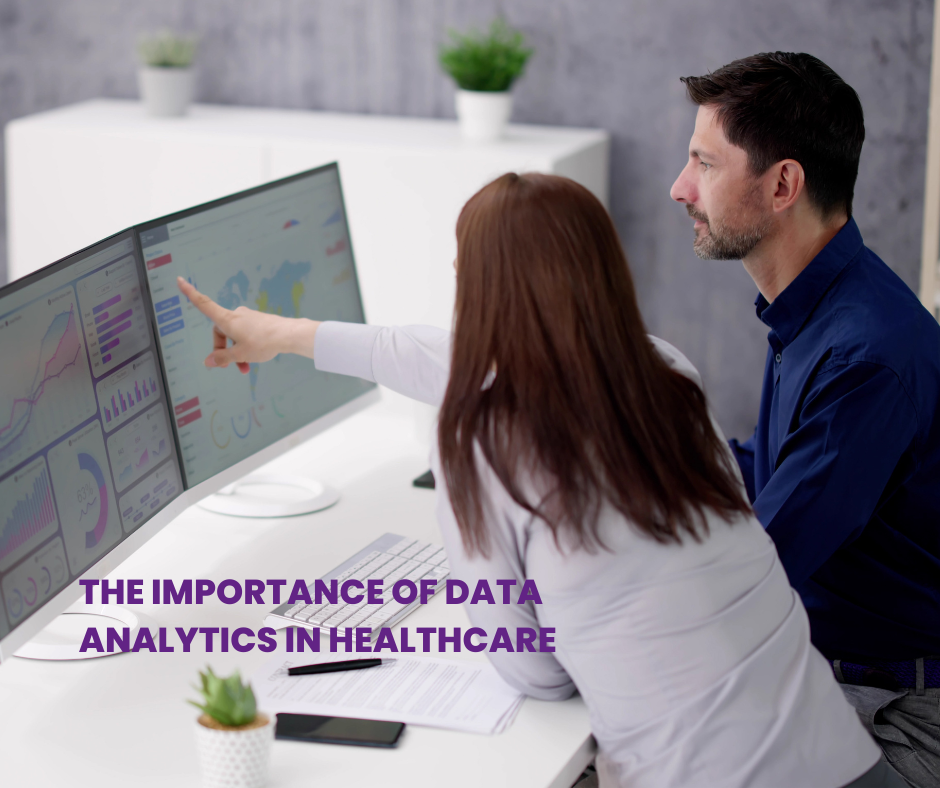The Importance of Data Analytics in Healthcare
 Ruhi Parveen
Ruhi Parveen
Data analytics has become a cornerstone in transforming various industries, and healthcare is no exception. With the ability to analyse vast amounts of data, healthcare organisations can improve patient outcomes, optimise operations, and make informed decisions. In this article, we will explore the critical role of data analytics in healthcare, its applications, benefits, challenges, and future prospects.
1. Introduction to Data Analytics in Healthcare
Data analytics involves the systematic computational analysis of data, which can uncover patterns, correlations, and insights that might otherwise go unnoticed. In healthcare, data analytics refers to the process of examining large and varied data sets to improve medical outcomes and operational efficiency. The integration of data analytics into healthcare has the potential to revolutionize patient care by enabling more personalized and efficient treatments.
2. Applications of Data Analytics in Healthcare
1 Predictive Analytics for Patient Care
Predictive analytics uses past data to forecast future outcomes. In healthcare, it can forecast disease outbreaks, patient admissions, or the likelihood of certain health events. For example, predictive models can identify patients at high risk of readmission, allowing healthcare providers to implement preventive measures.
2 Precision Medicine
Precision medicine is an approach that customizes medical treatment based on each patient's unique characteristics.Data analytics plays a crucial role in this by analyzing genetic, environmental, and lifestyle factors to recommend personalized treatment plans. This method increases the effectiveness of treatments and reduces the trial-and-error process often associated with finding the right therapy.
3 Operational Efficiency
Healthcare organizations can use data analytics to streamline operations. By analyzing patient flow, resource utilization, and staffing levels, hospitals can optimize their operations, reduce wait times, and improve the overall patient experience. This not only enhances patient satisfaction but also helps in cost management.
4 Population Health Management
Population health management involves analyzing health outcomes of a group of individuals to improve the health of the entire population. Data analytics can identify trends and patterns in population health, such as the prevalence of chronic diseases, which can help in developing targeted intervention programs.
5 Fraud Detection and Prevention
Data analytics is also instrumental in detecting and preventing healthcare fraud. By analyzing billing patterns, payment records, and patient data, healthcare providers can identify unusual activities that may indicate fraudulent practices. This helps in safeguarding healthcare resources and ensuring that they are used appropriately.
3. Benefits of Data Analytics in Healthcare
1 Improved Patient Outcomes
One of the most significant benefits of data analytics in healthcare is the potential to improve patient outcomes. By analyzing patient data, healthcare providers can make better-informed decisions about diagnosis, treatment plans, and follow-up care. This leads to more effective and personalized care, which ultimately improves patient health.
2 Cost Reduction
Data analytics can significantly reduce healthcare costs by identifying inefficiencies and optimizing resource allocation. For example, predictive analytics can reduce the number of unnecessary hospital readmissions by identifying at-risk patients and providing them with the necessary care to prevent readmission.
3 Enhanced Patient Engagement
Data analytics enables healthcare providers to engage with patients more effectively. By understanding patient behaviors and preferences, providers can offer personalized communication and care plans, leading to higher patient satisfaction and better adherence to treatment regimens.
4 Better Decision-Making
With access to real-time data and analytics, healthcare providers can make quicker and more accurate decisions. Whether it’s selecting the most effective treatment for a patient or making operational adjustments, data-driven decision-making leads to better outcomes.
5 Research and Innovation
Data analytics supports research and innovation in healthcare by providing insights into disease patterns, treatment outcomes, and patient behaviors. This can accelerate the development of new drugs, treatments, and medical technologies, leading to advancements in the field of medicine.
4. Challenges in Implementing Data Analytics in Healthcare
1 Data Privacy and Security
One of the primary concerns in healthcare data analytics is ensuring the privacy and security of patient information. Implementing robust security measures and adhering to regulations like HIPAA is essential for protecting patient data.
2 Data Integration and Interoperability
Healthcare data comes from various sources, such as electronic health records (EHRs), medical devices, and patient surveys. Integrating and standardizing this data for analysis can be challenging due to the lack of interoperability between different systems. Achieving seamless data integration is crucial for effective analytics.
3 High Costs of Implementation
Implementing data analytics in healthcare requires significant investment in technology, infrastructure, and skilled personnel. The high costs associated with these investments can be a barrier, especially for smaller healthcare organizations.
4 Data Quality and Accuracy
For data analytics to be effective, the quality and accuracy of the data are paramount. Ensuring data quality through regular audits and validation is critical.
5 Resistance to Change
Healthcare professionals may be resistant to adopting data analytics due to concerns about increased workload, the complexity of new systems, or fear of technology replacing human judgment. Addressing these concerns through training and demonstrating the value of analytics is important for successful implementation.
5. The Future of Data Analytics in Healthcare
1 Artificial Intelligence and Machine Learning
The future of data analytics in healthcare is closely tied to advancements in artificial intelligence (AI) and machine learning. These technologies can analyze vast amounts of data at unprecedented speeds, leading to more accurate predictions, personalized treatments, and efficient operations. AI-powered tools can assist in diagnosing diseases, predicting patient outcomes, and even recommending treatment plans.
2 Real-Time Analytics
Real-time data analytics is becoming increasingly important in healthcare, allowing providers to monitor patients’ health status continuously and make immediate interventions when necessary. Wearable devices and IoT (Internet of Things) technology are enabling real-time data collection, which can be analyzed instantly to provide timely care.
3 Blockchain for Data Security
Blockchain technology holds promise for enhancing data security in healthcare. By creating a decentralized and immutable ledger of patient data, blockchain can ensure that health records are secure and tamper-proof. This can help build trust among patients and providers, ensuring that data analytics is conducted in a secure environment.
4 Telemedicine and Remote Monitoring
The rise of telemedicine and remote monitoring has been accelerated by data analytics. Through the analysis of data from remote monitoring devices, healthcare providers can offer continuous care to patients in their homes, reducing the need for hospital visits and improving patient outcomes.
5 Personalized Health Plans
As data analytics continues to evolve, the concept of personalized health plans will become more prevalent. These plans will be based on a comprehensive analysis of a patient’s genetic makeup, lifestyle, and medical history, offering highly tailored treatment and prevention strategies.
6. Conclusion
Data analytics is playing a pivotal role in the transformation of healthcare. From improving patient outcomes to enhancing operational efficiency, its applications are vast and impactful. However, challenges such as data privacy, integration, and high costs need to be addressed to fully realize its potential. As technology continues to advance, the future of data analytics in healthcare looks promising, with the potential to revolutionize the way we approach patient care, research, and healthcare management. For those interested in acquiring expertise in this field, finding the Best Data Analytics Training in Delhi, Noida, Mumbai, Indore, and other parts of India can provide valuable insights and skills to harness the power of data effectively.
Healthcare organizations that embrace data analytics will be better positioned to provide high-quality, personalized care, reduce costs, and stay ahead in an increasingly competitive industry. The journey toward a data-driven healthcare system is just beginning, and the benefits it promises are too significant to ignore.
Subscribe to my newsletter
Read articles from Ruhi Parveen directly inside your inbox. Subscribe to the newsletter, and don't miss out.
Written by

Ruhi Parveen
Ruhi Parveen
I am a Digital Marketer and Content Marketing Specialist, I enjoy technical and non-technical writing. I enjoy learning something new.